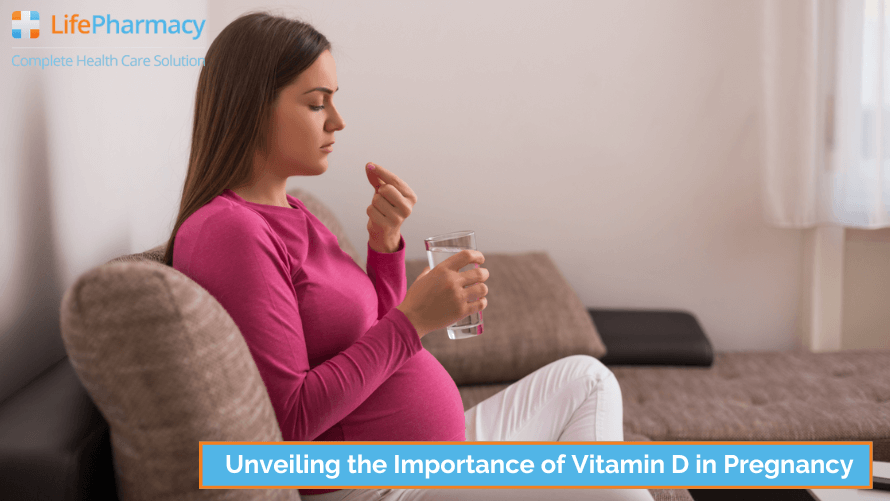Here's a staggering revelation: People across the globe wrestle with low Vitamin D levels, placing them at a high risk of deficiency. Particularly, pregnant women are more vulnerable to this trend.
Vitamin D isn't a mere nutrient but a hormone your body produces. This fat-soluble nutrient isn't solely associated with bone health through calcium and phosphorus absorption. Recent research sheds light on its potential as a protector against cancer cell growth, a guardian against infections, and a pacifier of inflammation.
The human body has Vitamin D receptors scattered across multiple organs, hinting at its multifaceted role that extends far beyond bone health. Scientists are curious to unearth Vitamin D's secrets for a healthier life. Meanwhile, online pharmacists urge you to embrace the potential of vitamins and supplements for a brighter, healthier you.
The Critical Role of Vitamin D for Pregnant Women
Unraveling the Sunshine Mystery for Moms-to-Be

Vitamin D isn't exactly a culinary superstar, as you can only source it from a few foods. You might stumble upon it in foods like mushrooms, eggs, and fatty fish like mackerel, salmon, and tuna. It can also be found in egg yolks, cheese, beef liver, cereal, dairy products, and orange juice that may be fortified with Vitamin D. But, the fact is that these sources can't provide sufficient amounts of this nutrient that your body craves.
The best and most abundant source of Vitamin D is the Sun itself, the ultimate vitamin D dispenser. The hitch is safeguarding the skin from the sunny rays and procuring Vitamin D during those gloomy winter months. If you are looking for reliable skin care products, look no further. Online pharmacy UK not only provides essential health supplements but also offers a range of quality skin care products to help you maintain healthy and protected skin throughout the year.
What's the remedy? Online chemists recommend a daily vitamin D supplement. It is undeniable that even with the best diet, reaching your vitamin D goals during pregnancy can be as elusive as sunshine in December. It's not just for healthy individuals; pregnant women, breastfeeding moms, and little ones need it, especially when the days grow darker between October and March.
Vitamin D Supplements for Every Stage of Motherhood

Vitamin D becomes an essential ally for pregnant and breastfeeding women, with a recommended daily intake of 10μg. The specialized range of products available at online pharmacy has been carefully crafted to meet the unique needs of pregnancy, ensuring the daily dose of vital nutrients.
The during pregnancy lineup includes a range of options such as Vitabiotics Pregnacare® Original, Pregnacare Liquid, Pregnacare Plus, Pregnacare Max, and even the delightful Pregnacare Gummies – all thoughtfully infused with the recommended 10μg of Vitamin D.
For those embracing the beautiful breastfeeding journey, our products cover your Vitamin D needs, providing the essential 10μg.
Count on the comprehensive range of supplements available at our online medical store to accompany you through the incredible stages of motherhood. And for a convenient way to access these essential products, look to your trusted online chemists.
Expecting a little miracle? Celebrate the joy and secure your and your little ones
well-being with essential vitamins and supplements from Life Pharmacy UK.
Count on Calcium During Pregnancy and Breastfeeding

Maintaining strong bones and teeth is pivotal for everyone's health, but it takes center stage during pregnancy and breastfeeding. One cannot deny the importance of vitamins and minerals when it comes to strengthening your hair, skin and nails. The significance of sufficient calcium intake extends to the well-being of the musculoskeletal, nervous, and circulatory systems, making it a non-negotiable requirement of pregnancy. To meet this demand, pregnant and lactating women should aim for 1000 mg of calcium daily, while pregnant and lactating teenagers need 1300 mg daily.
Calcium, in addition to its superstar companion vitamin D, works towards supporting these health aspects. Especially during pregnancy and breastfeeding, maintaining the required calcium levels is crucial as both the growing baby and breastfed infant call upon the mother's calcium reserves.
Dairy products like milk, yogurt and cheese, fortified flour-based items, green leafy vegetables such as kale, broccoli, dried figs and many others are rich dietary sources of calcium. These dietary calcium sources contribute to several critical endeavors during pregnancy.
In the event of an inadequate calcium intake, the body prioritizes the baby's needs, particularly during the third trimester when a daily transfer of 250 to 350 milligrams is the norm.
Insufficient calcium during pregnancy raises concerns about osteoporosis, a condition marked by fragile bones. While many women recuperate lost bone mass post-pregnancy and breastfeeding, it's wise to be well prepared by increasing your calcium intake during pregnancy.
The question of calcium supplements inevitably arises. Generally deemed safe for expectant mothers, calcium supplements have their cons. Excessive calcium intake via supplements may result in unwelcome side effects like gas or constipation. In most cases, a prenatal supplement containing calcium, combined with regular dietary calcium intake, suffices to meet both maternal and fetal requirements.
However, special circumstances demand consideration. For instance, vegans or individuals with lactose intolerance may need to pay extra attention to calcium-rich plant sources, including dark leafy greens, tofu, and nuts. A consultation with your healthcare provider is advisable, especially if you anticipate calcium deficiency or face preeclampsia risks.
Note: If you also incorporate iron supplements into your regimen, avoid taking them with calcium, as the latter can affect iron absorption. It is advisable to space these supplements at least two hours apart.
In essence, a balanced diet and a suitable prenatal vitamin from an online pharmacy can typically meet your calcium requirements during pregnancy. However, if you harbor doubts about your calcium intake, particularly in cases where dairy consumption is limited, a conversation with your healthcare provider is worthwhile.
Conclusion
Pregnancy is a critical phase in the life of both the expectant mother and the newborn. It's a time when the utmost care and attention are imperative to prevent any potential issues.
Incorporating nutritious foods, rich in vitamins and minerals into your diet will help you confidently stride through your pregnancy journey with strong bones, a healthy baby, and the peace of mind that comes from nurturing your well-being.
And who could be better equipped to assist you during this crucial phase of your life than Life Pharmacy UK? We're here to cater to all your medicinal needs, offering support and guidance every step of the way. Your health and well-being, as well as that of your baby, are our top priorities.
FAQs
-
When is the Best Time to Take Vitamin D?
Vitamin D is fat-soluble, meaning it dissolves in oils or fats. To enhance absorption, it's best to take it with foods containing healthy fats, such as olive oil, seeds, nuts, fatty fish, or eggs. While the debate continues about whether it's better to take vitamin D supplements with low-fat or high-fat foods, the consensus is that it should be taken with food.
Whether it's more effective to take vitamin D at night or in the morning isn't definitively established due to limited research. Some individuals prefer to take Vitamin D in the morning with a meal as there is a belief that taking vitamin D before bed may interfere with sleep. Although there isn't substantial scientific evidence to confirm this, if you think vitamin D affects your sleep negatively, consider shifting your supplement intake to earlier in the day. Ultimately, the key is to find a routine that works for you and stick with it to meet your vitamin D needs.






